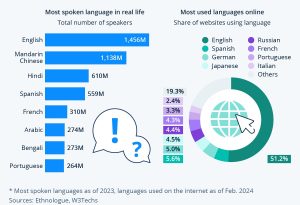Even in a globalized world, language barriers have the potential to exclude people from access to information and participation in the global conversation. After all, what good is the world wide web if you speak a language whose footprint barely extends beyond the borders of your own country?
Thankfully, there’s English, the internet’s lingua franca, connecting people from all over the world. According to estimates from W3Techs, more than half of all websites use English as their content language. And while English is in fact the best bet if you want to maximize your potential audience online, its global footprint is not as large as one might think.
English is the most spoken language worldwide when including non-native speakers, ahead of Mandarin Chinese

According to estimates from Ethnologue, a research center for language intelligence, roughly 1.46 billion people speak English around the world, of which roughly 380 million are native speakers.
That makes English the most spoken language worldwide when including non-native speakers, ahead of Mandarin Chinese, which is spoken by roughly 1.14 billion people worldwide, including 940 million native speakers.
The 1.46 billion people who speak English still make up less than 20 percent of the world population, meaning that roughly 4 in 5 people in the world are unable to understand 50 percent of all websites, at least without a translation tool.
As the following chart shows, some widely-spoken languages, such as Chinese, Hindi and Arabic, are underrepresented on the internet, while others such as English, German and Russian have a larger footprint online than they have in the real world.
Source Statista


